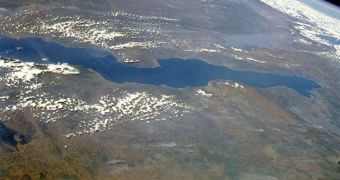In a paper published yesterday, May 16, scientists report record-high temperatures inside the world's second-deepest and second-oldest static body of water, Lake Tanganyika. Located in the eastern part of Africa, in the Great Rift Valley, the lake apparently experiences unprecedented warming, which places its current average temperature values above any other recorded over the past 1,500 years. It would appear that the entire region in which the lake is located is experiencing a surge in mean temperatures, and researchers attribute the phenomenon to the combined influences of global warming and climate change, LiveScience reports.
The discovery bears considerable implications for the millions of human beings depending on it as a source of daily sustenance. The fish stocks that exist within are the only source of food for numerous tribes in the area, and their depletion would equal a death sentence for these people. Given the warmer temperatures the lake experiences, it will most likely lose some of its productivity, which will translate into lower fish stock, and therefore less food. Experts are currently hard at work in determining the extent of the present damage, and in developing potential solutions to this crisis.
The sheer size of lake Tanganyika makes it visible from aboard the International Space Station. It appeared between two tectonic plates more than 13 million years ago, and surveys have determined that it has a depth of about 1.5 kilometers (approximately one mile). It is surrounded by the nations of Burundi, Tanzania, Zambia, and the Democratic Republic of the Congo, and its catchment basin covers an area of about 231,000 square kilometers ( about 89,000 square miles). The lake itself is relatively narrow, with an average width of about 50 kilometers, but it has a length of about 673 kilometers. Its depth is only surpassed by that that of Lake Baikal, which is 1,642 meters (5,387 feet) deep.
“Our data show a consistent relationship between lake surface temperature and productivity (such as fish stocks). As the lake gets warmer we expect productivity to decline, and we expect that it will affect the fishing industry,” explains scientist Jessica Tierney, who is a geologist at the Brown University. The warmest temperature was recorded in 2003, when measurement shows that its surface was heated at 78.8 degrees Fahrenheit (26 degrees Celsius). If temperatures continue to rise, then the 10 million people who, according to a 2001 report by the Lake Tanganyika Biodiversity Project, are dependent on its fish for sustenance could be in real danger. Some 200,000 tons of fish are extracted from the lake each year.

 14 DAY TRIAL //
14 DAY TRIAL //